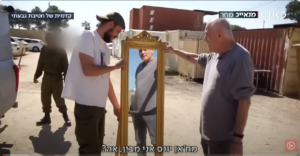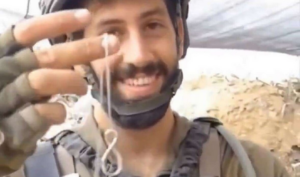Israeli soldiers’ looting in Gaza is part of the revenge

Israeli soldiers display a mirror they stole from Gaza on Israel’s public broadcaster, Kan.
Yagil Levy writes in Haaretz on 19 February 2024:
Almost beneath the public’s radar, soldiers have been looting the property of Gaza Strip residents after taking over their homes. In the daily Yedioth Ahronoth, columnist Nahum Barnea quoted the testimony of one reservist doctor: “Smaller, less disciplined forces have looted telephones, Dysons, motorcycles and bicycles. Fair? I was embarrassed. At some point, I stopped commenting on it, because I was viewed as a nudnik.”
A combat soldier in the Givati Brigade proudly showed Uri Levy, a reporter for Kan 11 public television, a large mirror taken from a home in Khan Yunis. On social media, soldiers post videos like the one of a soldier proudly displaying soccer jerseys taken from a Gaza home, while reservists boast of gourmet meals prepared from food they took from Gazans’ kitchens.
This plethora of verbal testimony reflects a widespread problem. But the army seems to be having trouble preventing it.
Yaniv Kubovich reported in the Haaretz Hebrew edition in December that the issue has come up in the chief of staff’s conversations with various units, but no systematic attempt has been made to prevent the looting. The chief education officer, who isn’t in the chain of command, issued a letter to the troops on this issue. Its ambiguous wording was accompanied by repeated underlining, all devoted to the looting, to show that this problem bothers the army.
Yet his arguments against the looting revolved around the harm it does to public trust in the army and unit cohesion, and the contribution it makes to anti-Israel propaganda. There’s only one argument that Brig. Gen. Ofir Livius forgot to mention: the self-evident prohibition against theft. Apparently it’s hard to talk to the soldiers about morality, so utilitarian arguments are needed.
The looting is dwarfed by the unprecedented death and destruction and the pride soldiers take in them, as documented in videos. But unlike these other issues, about which there’s a political argument, when it comes to looting, not only are the orders clear, but the prohibition against it is even rooted in the biblical book of Joshua, which is a source of inspiration for the army. Consequently, the army’s failure to prevent the looting attests to the problem’s uniqueness, which requires explanation.
The looting hasn’t developed in a vacuum; indeed, it has always existed. What’s new here is the scale, the soldiers’ pride in it and the army’s weakness in the face of it.

A video screengrab featuring an Israeli soldier displaying a silver necklace with the inscription ‘Made in Gaza’ which he pledged to give to his girlfriend
Soldiers aren’t necessarily looting to satisfy their physical needs, nor are they necessarily motivated by greed. Rather, looting in combat is an expression of a desire for revenge. This is not only the general desire revenge that has guided the entire war in the Gaza Strip, but also specific revenge for the property looted from residents of southern Israel on October 7 (indeed, that is one of the justifications sometimes given for the looting). The soldiers are also taking symbolic revenge, since taking their enemies’ property after defeating them symbolizes total victory.
Finally, the looting is a symbol of the general revenge. It’s no accident that it has been accompanied by the destruction of property, including more than one incident in which homes were burned down needlessly. Looting reflects a negation of the enemy population’s humanity, making it acceptable to rifle through their personal belongings, even the most intimate ones, and choose what to take.
The very fact that private property is being damaged merely confirms the assumption that lies at the basis of the fighting – that “there are no innocent civilians” in Gaza, and therefore it’s okay to harm civilians even after they have fled. This makes it clear that the looting isn’t a deviation from the fighting, but a continuation of this war of revenge through other means. Its existence helps maintain the troops’ fighting spirit, and therefore, the General Staff is hesitant to uproot it.
Now it’s up to ordinary Israelis to decide what kind of army they want fighting in their name.
This article is reproduced in its entirety
